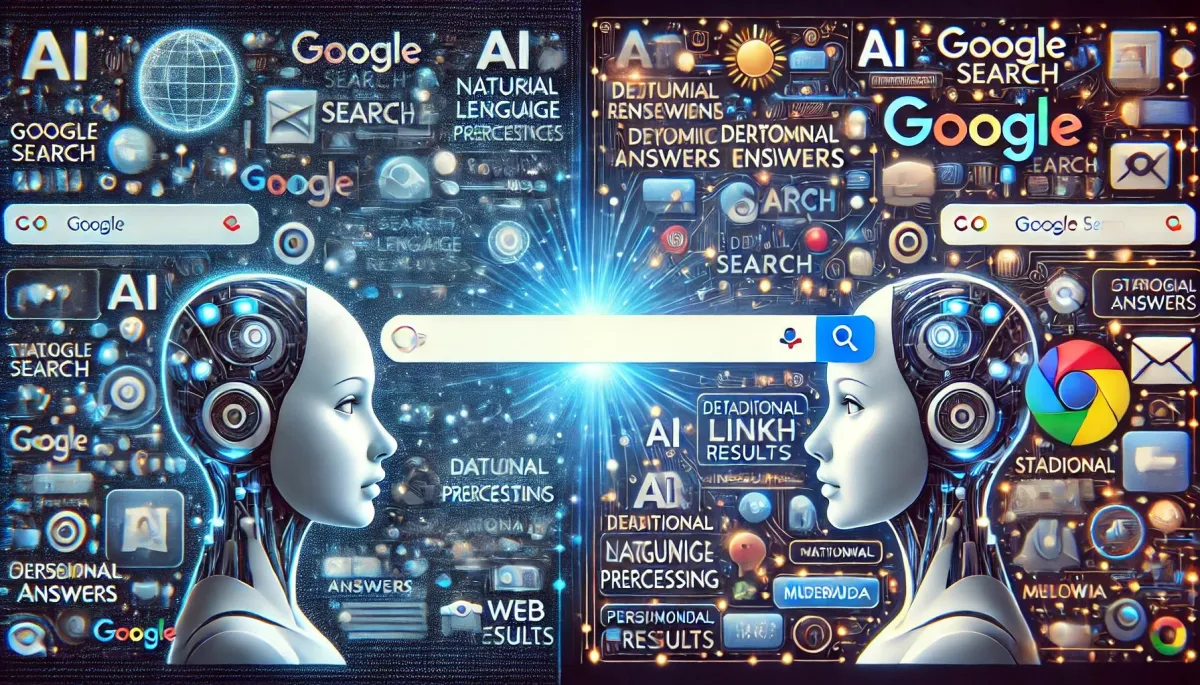Online Marketing Tips Blog
In this Daily blog, I'll try to answer the most burning questions for online marketing that I get in my consulting business. We help online business owners who are in affiliate marketing, coaching, eLearning and Online Events every single day. I'll share that info with you!

How to Optimize Your Website for AI Search vs. Google Search
As AI-driven search tools like ChatGPT, Grok, Perplexity, and OpenAI’s GPTBot become more prominent, marketers and business owners must adapt their digital strategies to stay visible. While traditional SEO focuses on ranking well on Google, optimizing for AI search introduces new tactics and considerations. This article will explore how AI and Google search differ, the adjustments required for AI optimization, and strategies that overlap between both.
By the end, you'll understand how to make your website a go-to source for both Google and AI-driven platforms.
How AI Search Differs from Google Search
To optimize your website for AI-driven search, it’s important to recognize the fundamental ways in which AI indexing differs from Google’s traditional crawling system:
AI Search
• Uses Pre-Trained Data: AI, such as ChatGPT or Perplexity, typically relies on datasets that have already been collected, rather than "live" crawling the web in real-time.
• Focuses on Conversational Clarity and Utility: AI prioritizes content that directly answers user queries in a conversational tone.
• Not Time-Dependent: AI tools reference static datasets or selectively fetched data. Unlike Google, freshness and real-time updates have less weight unless AI is re-trained.
Google Search
• Continuously Crawls the Web: Googlebot actively crawls websites for content and uses hundreds of ranking signals to determine visibility.
• Heavily Weights Keywords and Backlinks: Content structure, keyword density, backlinks, and dwell time all play a critical role in ranking within Google.
• Dynamic Ranking: Updates to content and user engagement signals frequently impact your search engine ranking.
These differences mean that achieving success in AI indexing requires a shift in focus toward usability, semantic depth, and authoritative content.
Key Strategies for Optimizing for AI Search
1. Prioritize Structured and Conversational Content
AI excels at extracting answers from clear and structured content. Formatting your content in a way that's easy for AI to process increases the likelihood of being referenced by AI-powered tools.
• Use Question-and-Answer Formats: For example, instead of a purely informational paragraph, structure it as “What is X?” followed by a concise explanation.
• Make Key Points Scannable: Use headings, bullet points, and summaries to ensure your content is easy for AI algorithms to extract critical takeaways.
• Focus on Semantic Richness: AI values in-depth content that covers a topic holistically over keyword-stuffed content. Think less “keyword density” and more “reader intent.”
2. Enhance Authority with Citations
AI tools often favor content that cites credible sources. Adding authoritative data, statistics, and quotes strengthens your content’s trustworthiness for AI indexing.
For instance, citing studies or reputable publications can increase your content’s chances of appearing in an AI-generated response. A recent study found that including citations increases AI-referenced visibility by up to 40%.
3. Optimize for User Intent Over Keywords
Unlike Google’s reliance on targeted keywords, AI focuses on delivering content that fully addresses a user’s intent.
For example, if someone asks, “What steps should I take to build a website?” AI prefers content that provides a step-by-step guide rather than simply sprinkling “build a website” throughout the page.
• Use tools like AnswerThePublic or People Also Ask sections on Google to identify conversational queries and address them thoroughly.
• Outline your content to ensure comprehensive coverage of the topic, addressing subtopics and frequently asked questions within the same piece.
4. Leverage Schema Markup
Structured data is critical for both Google and AI systems. Incorporating schema markup helps AI understand the purpose and context of your content.
• Use JSON-LD for FAQ, How-To, and Article schemas.
• Ensure your markup is error-free by testing it with Google’s Structured Data Testing Tool.
Proper schema usage increases the odds of AI platforms referencing your content while also improving traditional search visibility on Google.
5. Tune Your Robots.txt for AI Crawler Access
While Googlebots dominate web crawling, AI bots like GPTBot (used by OpenAI) and Perplexity's crawlers are emerging. Allowing access to AI crawlers in your robots.txt file can help improve your visibility in AI-driven search tools.
Example configuration for robots.txt:
```
User-agent: GPTBot
Allow: /
```
Blocking AI bots might hurt your chances of being indexed by future AI-powered platforms.
6. Use Multimedia Thoughtfully
AI systems increasingly process multimedia, such as images, PDFs, and videos, for added insights.
• Optimize alt text for images, ensuring descriptions are clear and relevant.
• Include captions and transcripts for videos and audio content to make them accessible for AI tools.
Structured multimedia elements improve content relevance for AI interpretation, enhancing your chances of being cited in AI-generated responses.
7. Publish on AI-Specific Platforms
AI tools often pull information from key platforms like Wikipedia or Quora. To increase your influence:
• Contribute high-quality, authoritative posts to platforms with frequent AI interactions.
• Collaborate with niche-specific hubs or industry sites popular within your field.
Unlike Google, where on-site performance primarily determines rankings, these external platforms can directly boost your relevance in AI responses.
Where Google SEO and AI Overlap
Even though optimizing for AI requires novel techniques, some traditional SEO practices remain just as relevant.
Shared Practices for Google and AI Search
• Maintain High-Quality Content: Both platforms reward well-researched, authoritative, and engaging content.
• Focus on Technical Health: Fast website load times, mobile responsiveness, and error-free navigation help ensure both Google and AI crawlers access your site seamlessly.
• Use Internal Linking: Internal links guide Google crawlers across your site and help AI understand the topical hierarchy of your content.
Practical Steps to Get Started
1 Audit Existing Content
Rewrite key pages to adopt a question-and-answer format, ensuring they respond to common user queries.
2 Test Accessibility for AI Crawlers
Use tools like Screaming Frog or WebSite Auditor to ensure your site is accessible to AI bots and has no errors or roadblocks.
3 Track AI-Specific Metrics
Google Analytics won’t show AI-originated traffic. Instead, monitor referral traffic from platforms like Perplexity or GPT-based tools.
4 Experiment on AI-Favored Sites
Test publishing content on platforms that AI frequently references. For example, try Quora or Perplexity for broader distribution.
Adapt for the Future of Search
Google remains essential, but the rise of AI-powered search tools introduces a dynamic new frontier for marketers and website owners. By blending traditional SEO strategies with AI-optimized techniques—such as prioritizing conversational, authoritative, and structured content—you can future-proof your website for both worlds.
Adapting now positions your brand for increased visibility as AI search tools continue to evolve.
For more online marketing insights, click the link and come join my FREE Mastermind Group.
If you have specific questions you would like to see answered in this blog, please send them to me at [email protected]. I will try to address every question here.
If you follow the links in my blog, some of them will be affiliate links and I will be compensated if you purchase a course or product from these links. This is no way increases your price or changes my opinion on these courses. I only recommend things I use in my business.
For the absolute best training online for Affiliate Marketing, Coaching, Events & Masterminds and eLearning - Online Courses: Check out our Flagship Program Here.

Copyright © 2025 | All Affiliate Cash | All Rights Reserved
There may be affiliate links on these pages. When you follow them and purchase something, I may be paid a commission. This does not raise your cost of the item, and does not influence my opinion or review of the item in any way.
NOT FACEBOOK™: This site is not a part of the Facebook™ website or Facebook Inc. Additionally, This site is NOT endorsed by Facebook™ in any way. FACEBOOK™ is a trademark of FACEBOOK™, Inc.

